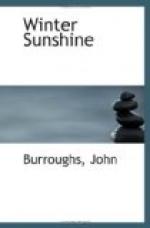Before I had got fifty yards from the station I began to hear the larks, and being unprepared for them I was a little puzzled at first, but was not long discovering what luck I was in. The song disappointed me at first, being less sweet and melodious than I had expected to hear; indeed, I thought it a little sharp and harsh,—a little stubbly,—but in other respects, in strength and gladness and continuity, it was wonderful. And the more I heard it the better I liked it, until I would gladly have given any of my songsters at home for a bird that could shower down such notes, even in autumn. Up, up, went the bird, describing a large easy spiral till he attained an altitude of three or four hundred feet, when, spread out against the sky for a space of ten or fifteen minutes or more, he poured out his delight, filling all the vault with sound. The song is of the sparrow kind, and, in its best parts, perpetually suggested the notes of our vesper sparrow; but the wonder of it is its copiousness and sustained strength. There is no theme, no beginning, middle, or end, like most of our best birdsongs, but a perfect swarm of notes pouring out like bees from a hive, and resembling each other nearly as closely, and only ceasing as the bird nears the earth again. We have many more melodious songsters; the bobolink in the meadows for instance, the vesper sparrow in the pastures, the purple finch in the groves, the winter wren, or any of the thrushes in the woods, or the wood-wagtail, whose air song is of a similar character to that of the skylark, and is even more rapid and ringing, and is delivered in nearly the same manner; but our birds all stop when the skylark has only just begun. Away he goes on quivering wing, inflating his throat fuller and fuller, mounting and mounting, and turning to all points of the compass as if to embrace the whole landscape in his song, the notes still raining upon you, as distinct as ever, after you have left him far behind. You feel that you need be in no hurry to observe the song lest the bird finish; you walk along, your mind reverts to other things, you examine the grass and weeds, or search for a curious stone, still there goes the bird; you sit down and study the landscape, or send your thoughts out toward France or Spain, or across the sea to your own land, and yet, when you get them back, there is that song above you, almost as unceasing as the light of a star. This strain indeed suggests some rare pyrotechnic display, musical sounds being substituted for the many-colored sparks and lights. And yet I will add, what perhaps the best readers do not need to be told, that neither the lark-song, nor any other bird-song in the open air and under the sky, is as noticeable a feature as my description of it might imply, or as the poets would have us believe; and that most persons, not especially interested in birds or their notes, and intent upon the general beauty of the landscape, would probably pass it by unremarked.




